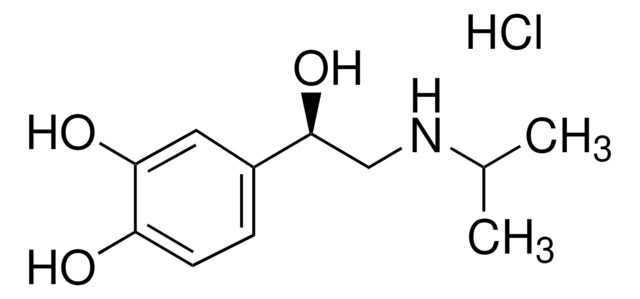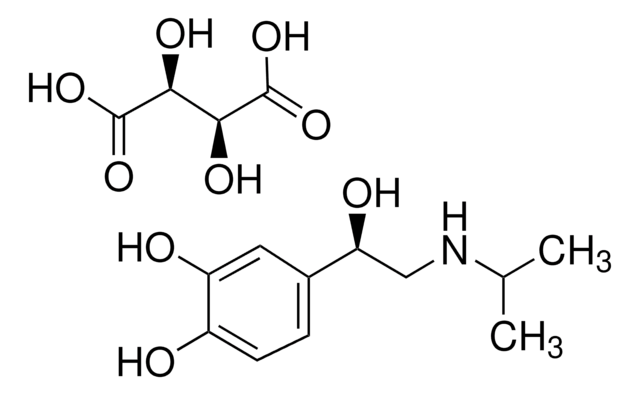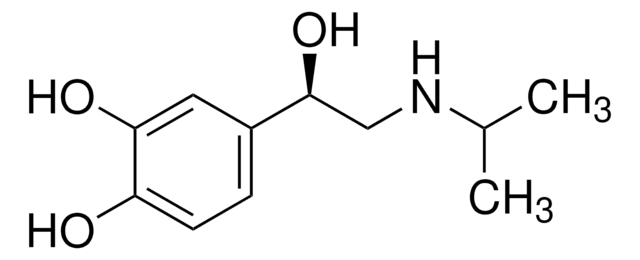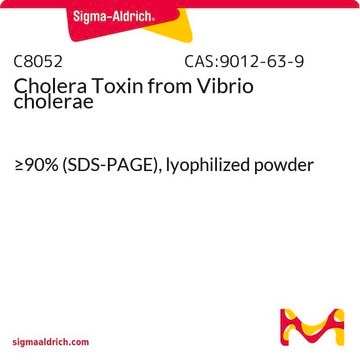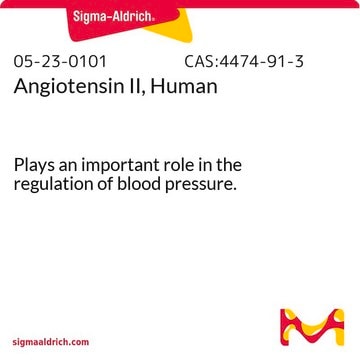420355
Isoprenaline hydrochloride
≥99% (TLC), solid, β-adrenoceptor agonist, Calbiochem
Sinónimos:
Isoproterenol, Hydrochloride
About This Item
Productos recomendados
product name
Isoproterenol, Hydrochloride, Phenethylamine derivative.
Quality Level
assay
≥99% (TLC)
form
solid
manufacturer/tradename
Calbiochem®
storage condition
OK to freeze
protect from light
color
white to off-white
white
solubility
ethanol: soluble
water: soluble
shipped in
ambient
storage temp.
10-30°C
InChI
1S/C11H17NO3.ClH/c1-7(2)12-6-11(15)8-3-4-9(13)10(14)5-8;/h3-5,7,11-15H,6H2,1-2H3;1H
InChI key
IROWCYIEJAOFOW-UHFFFAOYSA-N
General description
Biochem/physiol Actions
β-adrenergic agonist
Warning
Reconstitution
Other Notes
Carmena, M.J., et al. 1997. Prostate 33, 46.
Takemura, H., et al. 1995. J. Pharmacol. Exp. Ther. 274, 584.
Kishimoto, I., et al. 1994. J. Biol. Chem.269, 28300.
Macaulay, S.L., et al. 1994. Mol. Cell Biochem.141, 27.
Yashiro, K., et al. 1994. J. Biochem.115, 1040.
Ladenheim, R.G., et al. 1993. J. Neurochem.60, 260.
von Zastrow, M., et al. 1993. J. Biol. Chem.268, 763.
Mokhtari, A., et al. 1985. J. Cyclic Nucleotide Protein Phosphorylation Res.10, 213.
Legal Information
Storage Class
11 - Combustible Solids
wgk_germany
WGK 2
flash_point_f
Not applicable
flash_point_c
Not applicable
Certificados de análisis (COA)
Busque Certificados de análisis (COA) introduciendo el número de lote del producto. Los números de lote se encuentran en la etiqueta del producto después de las palabras «Lot» o «Batch»
¿Ya tiene este producto?
Encuentre la documentación para los productos que ha comprado recientemente en la Biblioteca de documentos.
Los clientes también vieron
Artículos
Gain a deeper understanding of the various types of receptor agonists and antagonists, including full, partial, and inverse agonists and competitive/reversible and non-competitive/irreversible antagonists.
Gain a deeper understanding of the various types of receptor agonists and antagonists, including full, partial, and inverse agonists and competitive/reversible and non-competitive/irreversible antagonists.
Gain a deeper understanding of the various types of receptor agonists and antagonists, including full, partial, and inverse agonists and competitive/reversible and non-competitive/irreversible antagonists.
Gain a deeper understanding of the various types of receptor agonists and antagonists, including full, partial, and inverse agonists and competitive/reversible and non-competitive/irreversible antagonists.
Nuestro equipo de científicos tiene experiencia en todas las áreas de investigación: Ciencias de la vida, Ciencia de los materiales, Síntesis química, Cromatografía, Analítica y muchas otras.
Póngase en contacto con el Servicio técnico